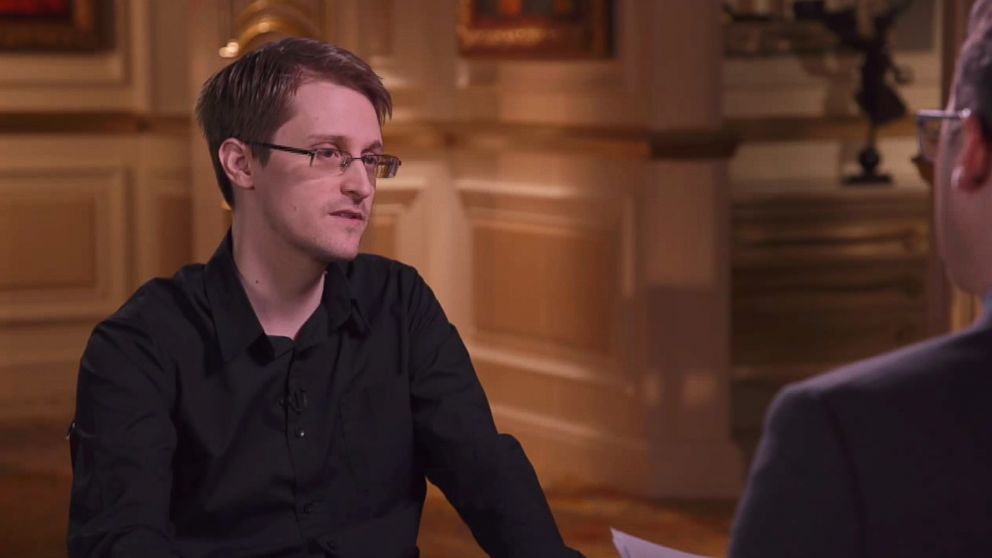Insider's View: How 'Snowden' Gets It Dangerously Wrong
Hollywood shows NSA leaker as a hero and he is... but for America's enemies.
NEWS ANALYSIS— -- Richard Clarke is an ABC News national security consultant. He held senior national security positions in the White House during the administrations of George H.W. Bush, Bill Clinton, and George W. Bush. Following the Snowden disclosures, he served as a member of President Obama’s Review Group on Intelligence and Information Technology.
Oliver Stone’s movie "Snowden" is apparently part of a campaign by Edward Snowden and his supporters to obtain a legal pardon from President Obama for Snowden’s violation of U.S. criminal law.
Snowden, who was a technician working for a company contracted to support the National Security Agency (NSA), illegally downloaded thousands of documents classified Top Secret, fled the country with them and gave the documents to people who published them online. He remains in exile in Moscow.

I recently watched the movie from the perspective of a private citizen, but one who had once worked in the government in world of intelligence, counter-terrorism and security. I am also one of the five people who President Obama asked to serve on the Review Group on Intelligence and Communications Technology, a panel he created to review the issues raised by the Snowden revelations. Our conclusions and recommendations are all publicly available on the White House website.
As part of that Review Group, I had unrestricted access to what NSA was doing and came to some personal judgments about their value and about the effects of Snowden’s revelations.
There was one NSA program that I had not heard of before and which gave me pause. Without a clear Congressional authorization, NSA was collecting telephone “metadata” on calls made in the U.S. Metadata in this case means not the content of the calls, but the “to/from” numbers and the duration of the calls. They were collecting that information on all calls on certain networks, not just calls made by specific people identified in a court order.
That process reversed the American legal tradition of only collecting such data with the permission of a judge and only narrowly targeting people who had raised suspicion of illegal activity. Although I understood the motivation in collecting that data to prevent terrorist attacks, it seemed an over-reach. However, other than a handful of incredibly rare, superficial instances, there was no evidence that NSA or any other government agency had abused that data access to in anyway harm or damage innocent Americans.
The Review Group recommended that program be terminated. The President and the Congress agreed and it was shut down. Snowden pointed to that action, shutting down that one program, as justification for his massive leak of Top Secret information to the world.
Snowden, however, did not just reveal that one somewhat dubious NSA collection program -- he revealed scores of NSA collection activities.
Those other programs were effectively tracking the activities and individuals in terrorist groups, drug cartels, human trafficking rings, nuclear proliferation programs, cyber crime gangs and foreign espionage agencies like Russia’s Federal Security Bureau (FSB), the successor of the Cold War KGB.
After Snowden's revelations of how the U.S. tracked those activities, many of the targeted groups changed the way they communicated to evade NSA’s collection. The U.S. suddenly had less ability to prevent terrorist attacks, cocaine smuggling, and espionage.
It is true that the U.S. may ultimately re-gain some of the access it lost because of Snowden -- some but not all. Gaining any new ability to track terrorists, criminals and spies will likely cost taxpayers billions of dollars.
With that knowledge, it was hard to reconcile what I saw on the big screen in "Snowden" or what Snowden himself says in interviews with what I know to be the facts.
Edward Snowden was not ever a trained "spy", as he claims, nor did he conduct special programs on the direct orders of the number two person in NSA, as shown in the movie. He was a computer network technician employed by a contractor, working to support NSA. He never met the Deputy Director of NSA.
Edward Snowden also did not heroically act as a whistle blower on one questionable program. He indiscriminately collected and dumped information on dozens of valuable programs designed to keep Americans and our allies safe. Americans, you and me, are less safe because of what he did.
Edward Snowden is a hero, however. He is a hero in the eyes of people in groups like ISIS and al-Qaeda, in the minds of drug cartel kingpins and in the view of the leadership of enemy intelligence agencies, places like the FSB headquarters in Moscow. For Snowden, now a resident of Moscow, has made their jobs easier, their lives safer.
I know movies have to take liberties with facts to fit a story into two hours. I recognize that directors like Oliver Stone have every right to create cinema with a point of view, ignoring facts and giving just one side of the story. The U.S. president, however, knows the facts and is painfully aware of the damage Snowden did.
If Snowden thinks he can persuade a jury of his peers that what he did was right or a federal judge that he deserves a light sentence for the myriad laws he broke, then he can get on any of the daily flights from Moscow to the U.S. No one is stopping him.
If, however, he is waiting in Moscow for a presidential pardon before he returns to the U.S., he is likely to wait there forever.




